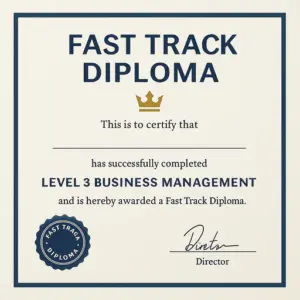
FAST TRACK DIPLOMA – LEVEL 3 – FOUNDATION DIPLOMA IN ENGINEERING
Level 3 Foundation Diploma in Engineering
Provider: Fast Track Diploma — 100% online for Nigerian students
Hero summary
Level 3 Foundation Diploma in Engineering — a practical, industry-aligned online qualification that introduces core engineering principles across mechanical, electrical and civil strands. Designed for Nigerian learners, this foundation diploma prepares you for technician roles, apprenticeships or progression to HND/degree programmes by building technical knowledge, practical problem-solving and CAD/workshop skills.
Mode: 100% online — study from anywhere in Nigeria with guided practical activities and local placement support Duration: Fast-track options from 16–36 weeks (self-paced routes available) Assessment: Practical assignments, CAD/workshop evidence, tests and a final synoptic project Qualification level: Level 3 foundation diploma (comparable to A-levels / vocational foundation level)
Why this course suits Nigerian students
Fully online delivery reduces relocation and accommodation costs — study from Lagos, Kano, Port Harcourt, Abuja or any location with internet access.
Localised engineering examples and case studies (infrastructure, power, manufacturing and transport) relevant to Nigeria’s economy.
Guidance on arranging local supervised workshop time or industry visits to gather practical evidence where required.
Low-bandwidth learning materials, downloadable CAD files and flexible scheduling of live sessions in Nigerian time zones.


Entry requirements (Nigerian applicants)
Typical entry: 5 SSCE/WASSCE/NECO passes including English and Maths, or equivalent
Basic numeracy and interest in practical technical tasks required
Mature applicants with relevant workshop experience may be considered
Required: internet access and a laptop/desktop for CAD; access to basic hand tools and a local workshop for practical tasks is recommended
Study structure & learner support
Flexible pathways: intensive fast-track or extended self-paced routes to suit work and family commitments
Blended practical evidence: guidance and templates for arranging supervised local workshop time, or simulated home-based tasks where appropriate
Learning materials: video demonstrations, CAD files, downloadable worksheets and low-bandwidth options
Tutor support: personalised feedback, live Q&A sessions and peer forums scheduled for Nigerian time zones
Industry links: optional employer engagement sessions and advice on apprenticeships or local training partners

Learning outcomes
On successful completion you will be able to:
Apply core engineering maths and physics to solve practical problems
Produce basic technical drawings and CAD models to industry standards
Demonstrate safe workshop practices and carry out basic fabrication and maintenance tasks
Understand and build simple electrical and mechanical systems
Plan and document a small engineering project including health & safety and sustainability considerations
Produce a portfolio of practical and theoretical evidence suitable for employers or further study
Assessment & certification
Assessment methods include tutor-marked assignments, CAD submissions, workshop evidence (photos/videos/logs), written tests and a final synoptic project.
Award: Level 3 Foundation Diploma in Engineering issued by Fast Track Diploma.
Certification: digital certificate and transcript provided on successful completion; optional printed certificate and portfolio export available on request.

Who this course is for
SSCE/WASSCE/NECO graduates seeking an entry route into engineering or technical roles
School leavers aiming to progress to HND, foundation degree or apprenticeship pathways
Junior technicians, artisans or workshop assistants seeking formal recognition of skills
Career changers wanting foundational engineering knowledge before specialising
What you’ll learn (core modules)
Engineering Principles & Materials — basic mechanics, properties of materials and selection criteria
Mathematics for Engineering — algebra, trigonometry, units, measurements and applied problem solving
Engineering Drawing & CAD Fundamentals — technical drawing, orthographic projection and introductory CAD modelling
Workshop Practice & Fabrication — safe use of hand and power tools, basic welding, fitting and measurement
Electrical Fundamentals — circuits, Ohm’s law, simple wiring, motors and control basics
Mechanical Systems & Maintenance — gears, bearings, lubrication and basic maintenance tasks
Fluid Mechanics & Pneumatics (Introductory) — pumps, flow basics and simple hydraulic/pneumatic systems
Thermodynamics & HVAC Basics (Introductory) — heat transfer fundamentals and basic refrigeration/air flow concepts
Engineering Project Management & Health & Safety — basic planning, risk assessment and workplace safety regulations
Sustainability & Materials Lifecycle — environmental impact, recycling and energy efficiency principles
Final Synoptic Project — integrated engineering task combining design, calculations, documentation and practical evidence relevant to a Nigerian context

Career Outcomes & Progression
Typical roles and next steps: Engineering Technician / Maintenance Technician Workshop Supervisor / Fabricator Electrical Technician or Mechanical Fitter Progression to HND, Foundation Degree, apprenticeship schemes or specialized certificates (welding, PLCs, HVAC)

Fees & payment (Nigeria)
Competitive fees with instalment plans, employer/group discounts and occasional scholarships. Contact Student Services for current NGN pricing, acceptable local payment channels (bank transfer, card, mobile money) and guidance on employer-sponsored training.

Frequently asked questions (FAQ)
Will I get hands-on workshop experience? Yes — the course includes workshop-based tasks. Where learners cannot access a training centre, we provide guidance for supervised local arrangements or simulated tasks and alternative evidence collection. Do I need CAD experience? No — CAD fundamentals are taught from beginner level with downloadable exercises and tutor support. Is this recognised in Nigeria? The foundation diploma is an internationally-recognised vocational qualification that supports employment and further study; confirm specific employer or institution entry requirements where necessary.
FAST TRACK DIPLOMA SUPPORTS ALL STUDENTS IN NIGERIA AND ITS TOWNS AND CITIES
| Lagos | Oyo | Ilesa | Ila |
|---|---|---|---|
| Kano | Sokoto | Gombe | Shaki |
| Ibadan | Owerri | Obafemi Owode | Ijero |
| Benin City | Yola | Owo | Ikot Ekpene |
| Port Harcourt | Calabar | Suleja | Jalingo |
| Aba | Umuahia | Lavun | Otukpo |
| Jos | Ondo | Potiskum | Okigwe |
| Ilorin | Minna | Kukawa | Kisi |
| Abuja | Lafia | Gusau | Buguma |
| Kaduna | Okene | Iwo | Funtua |
| Enugu | Katsina | Bida | Abakaliki |
| Zaria | Ikeja | Ugep | Asaba |
| Ogbomosho | Nsukka | Ijebu Ode | Gbongan |
| Warri | Ado Ekiti | Epe | Igboho |
| Ikorodu | Awka | Ise Ekiti | Gashua |
| Maiduguri | Iseyin | Gboko | Bama |
| Ife | Mubi | Ilawe Ekiti | Uromi |
| Bauchi | Onitsha | Ikare | |
| Akure | Sagamu | Osogbo | |
| Abeokuta | Makurdi | Okpoko | |
| Uyo | Mokwa | Garki | |
| Badagry | Sapele |






